This website uses cookies so that we can provide you with the best user experience possible. Cookie information is stored in your browser and performs functions such as recognising you when you return to our website and helping our team to understand which sections of the website you find most interesting and useful.
Plainly for Purpose: the ultra-luxury tourism model championing conservation, community and commerce
By Tessa Crowley | 29 August 2024 | Indulge, Lifestyle, Travel, Wealth
We meet EMMY award-winning filmmakers, conservationists and hoteliers, Dereck and Beverly Joubert, to discover a life lived on the wild side and what their high-end African camps offer conscious travellers
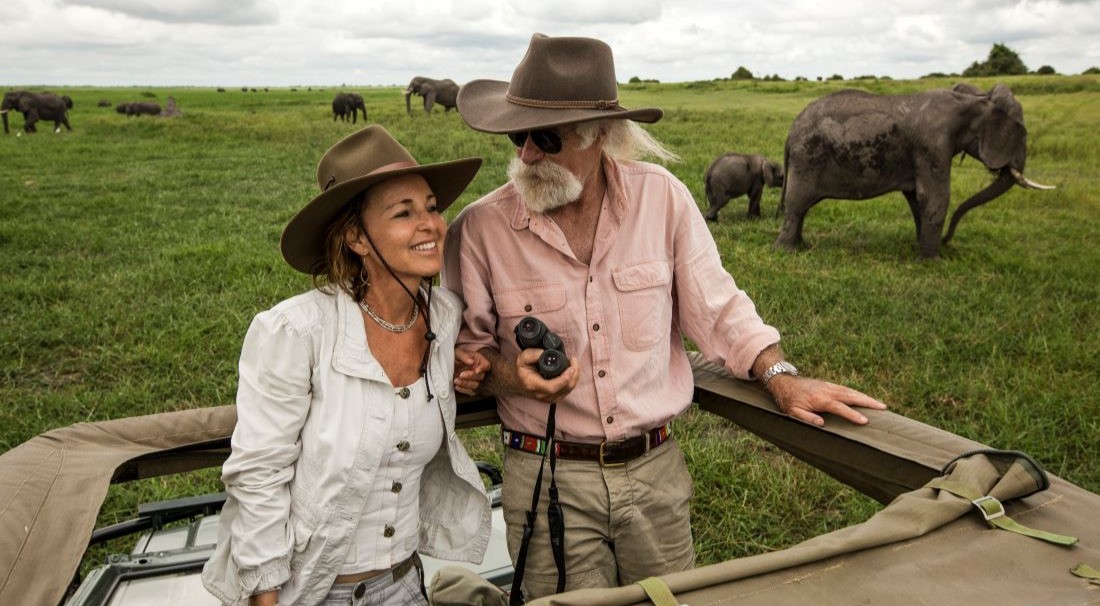 Dereck and Beverly Joubert have spent their lifetime roaming the African plains. Award-winning filmmakers turned conservationists turned hoteliers, the journey from endless dusty days capturing stories of the savannah to conservation champions has been as organic as it has inevitable. “As explorers, we had the opportunity to discover the finest places in Africa” Dereck shares. Now, “[we] invest in those, not just to protect them, but to create these unbelievable portals for people to come and visit the best of the best”.
Dereck and Beverly Joubert have spent their lifetime roaming the African plains. Award-winning filmmakers turned conservationists turned hoteliers, the journey from endless dusty days capturing stories of the savannah to conservation champions has been as organic as it has inevitable. “As explorers, we had the opportunity to discover the finest places in Africa” Dereck shares. Now, “[we] invest in those, not just to protect them, but to create these unbelievable portals for people to come and visit the best of the best”.
GREAT PLAINS CONSERVATION
He’s speaking, of course, about Great Plains Conservation, the duo’s fourteen-destination strong, ultra-luxury safari business. With camps in Kenya, Botswana, and Zimbabwe, the company appeals to ethically-minded, affluent guests, looking to combine a once-in-a-lifetime adventure with meaningful community impact and conservation. Great Plains’ first project in Botswana was a matter of necessity as much as intention. “Having founded the Big Cats Initiative with National Geographic, seeing massive declines in big cats around the world, we had to look at the solutions.” Realising the quickest way to support them was to save their habitat, the duo made the decision to purchase the land, “starting with a block of about 360,000 acres”.
“Once we decided to play a role in controlling and preserving the land, we needed to figure out how to pay for that. And so Great Plains was born. A tourism model, a high end, very sophisticated, but tented, tourism model, that could generate the funding we needed.”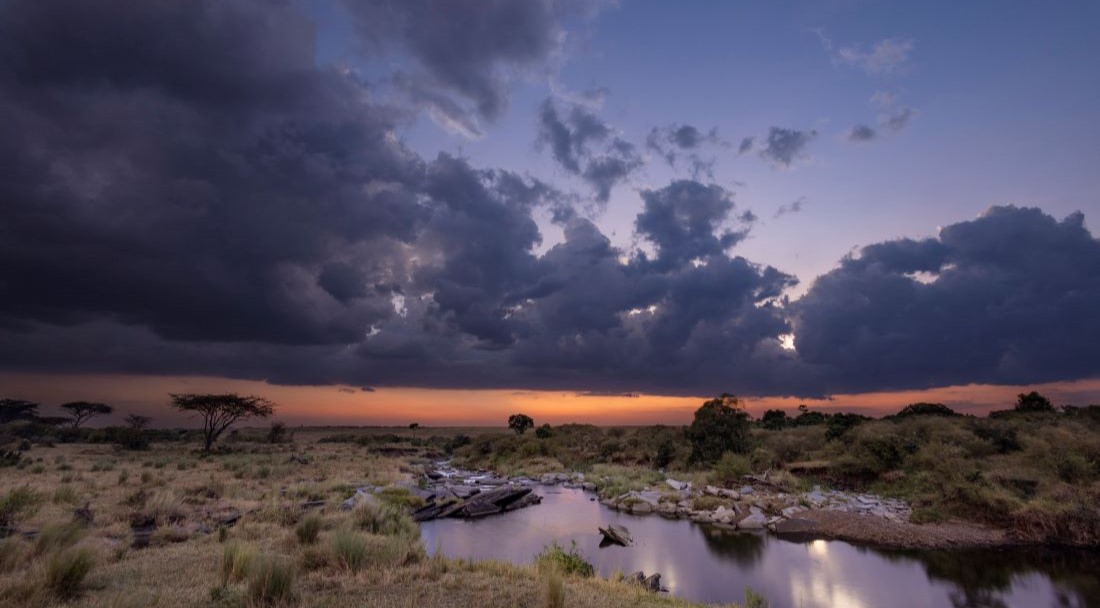 The idea is no doubt an admirable one, but does bringing more people into these wild places not pose an ecological challenge? The balance sounds hard to strike, but Great Plains’ focus on low footfall, high revenue tourism was conscious and considered. “The ecological footprint of having a bare piece of land and no human footprint is at zero, so that seems the ideal. The criticism of that version is, you don’t hire anybody, so you don’t provide any jobs”.
The idea is no doubt an admirable one, but does bringing more people into these wild places not pose an ecological challenge? The balance sounds hard to strike, but Great Plains’ focus on low footfall, high revenue tourism was conscious and considered. “The ecological footprint of having a bare piece of land and no human footprint is at zero, so that seems the ideal. The criticism of that version is, you don’t hire anybody, so you don’t provide any jobs”.
Reflecting the company’s high-end approach, Great Plains’ staffing ratio is “pretty close to five staff per one person – so we provide jobs, we provide a solid revenue stream to pay for the conservation, and we have a very low ecological footprint. We…then said, right, now how much do we have to charge everybody to pay for our conservation ambitions? Our business model works on need rather than profit”.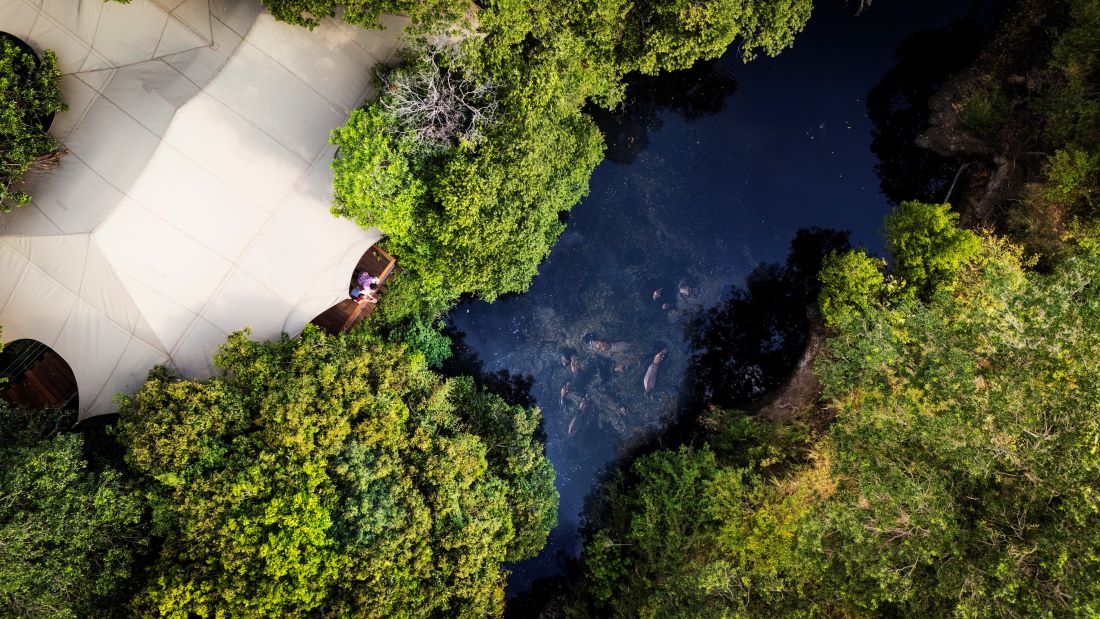 With each camp themed to tell its story, the fourteenth destination from Great Plains opened in Kenya last month. Charmingly suspended in the trees – a practicality to avoid being swept away by the annual floodwaters – Mara Toto Tree Camp’s attentive service and harmonious design is impeccable. “Somebody recently said that it truly is a tree house for adults, filled with all the luxury and the magic of being up in the trees”, smiles Beverly.
With each camp themed to tell its story, the fourteenth destination from Great Plains opened in Kenya last month. Charmingly suspended in the trees – a practicality to avoid being swept away by the annual floodwaters – Mara Toto Tree Camp’s attentive service and harmonious design is impeccable. “Somebody recently said that it truly is a tree house for adults, filled with all the luxury and the magic of being up in the trees”, smiles Beverly.
Nowhere is this better illustrated than Tent Three, which features a tree “right through the middle” [D]. An attractive feature for guests, but also a strong sustainability message, the design is a symptom of their steadfast rule that tree limbs thicker than a human thumb should be built around, rather than cut off. “The mantra is no compromise. We never compromise on design, on decor, on philosophy, on ethics, on sustainability. Zero compromise” [D]. They won’t stand for any damage to the forest, even at the expense of the human experience. Unsurprising, yet an impressive approach for such an ultra-luxury hospitality brand.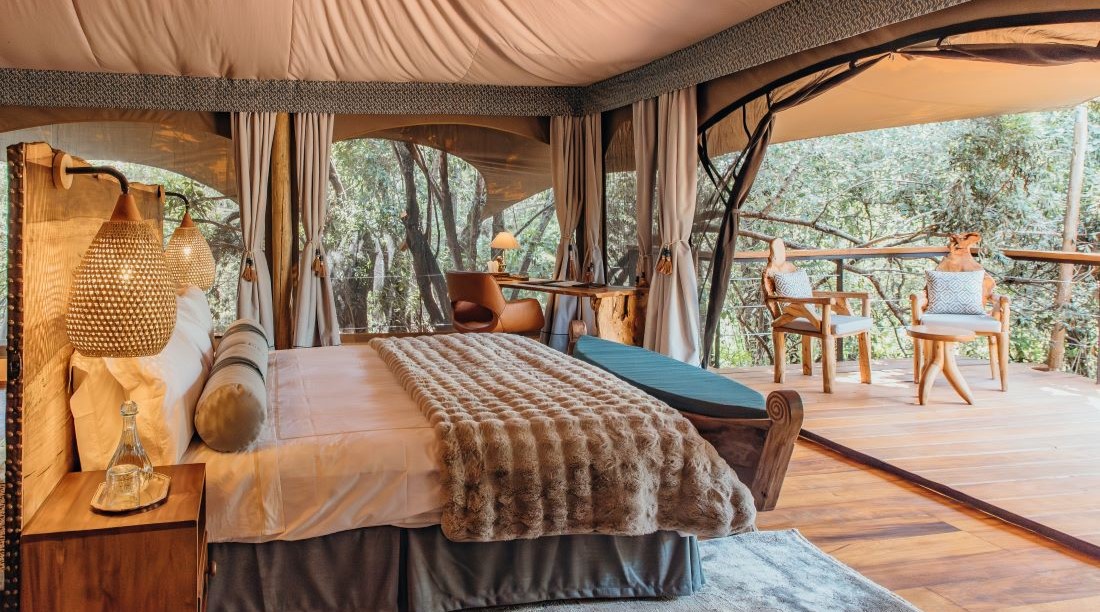 This steadfast commitment is encapsulated in the guest experience, which offers visitors a glimpse into the world as seen by the Jouberts. “We don’t divorce ourselves from nature. [Elsewhere], you go out on a safari but you return to the comfort of a camp. We wanted the forest to feel like it was in the tents, so that’s in the decor, the building aspects…It’s got a wonderful feel” explains Beverly.
This steadfast commitment is encapsulated in the guest experience, which offers visitors a glimpse into the world as seen by the Jouberts. “We don’t divorce ourselves from nature. [Elsewhere], you go out on a safari but you return to the comfort of a camp. We wanted the forest to feel like it was in the tents, so that’s in the decor, the building aspects…It’s got a wonderful feel” explains Beverly.
Speaking with the couple, you get the sense that their worldview and very being has been shaped by their constant immersion in and with nature. Measured, considered, and calm, yet fuelled by belief, their commitment to action sits comfortably within them. Afterall, Great Plains Conservation is, at its core, a funding model for their true passion – The Great Plains Foundation.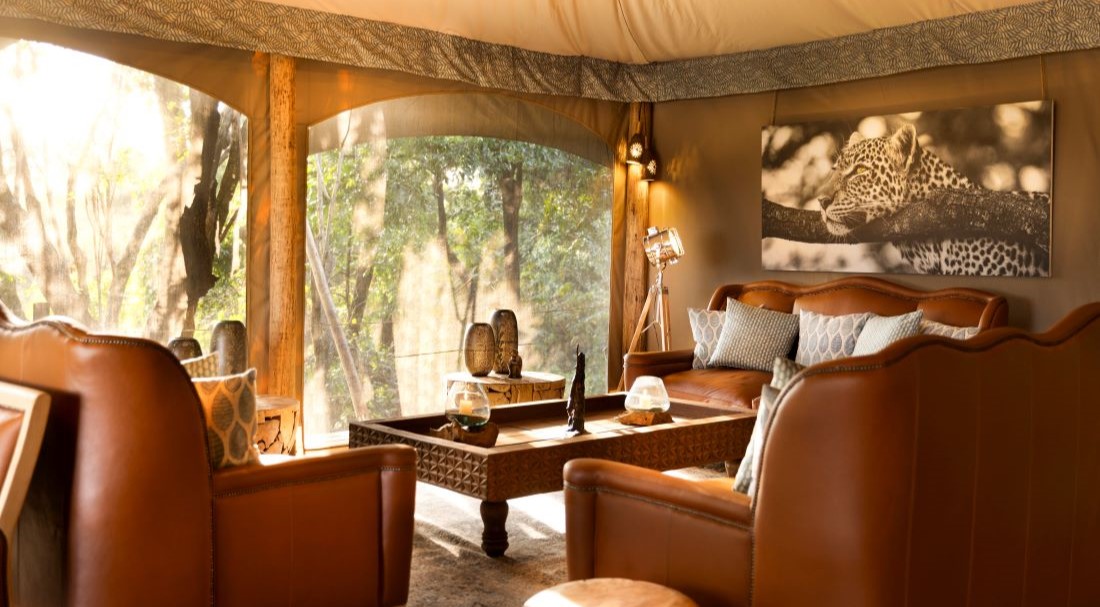 GREAT PLAINS FOUNDATION
GREAT PLAINS FOUNDATION
With more camps on the horizon, the scale of Great Plains Conservation is testament to the funding needs of the projects Great Plains Foundation undertakes – the Joubert’s breathtaking ambition rooted in action and community. It’s a lot for one organisation, but with such a focused duo at the helm, the impact is immeasurable.
Seeing themselves as an integral part of – rather than distinct from – the communities they work with undoubtedly helps, giving them a level of respect and understanding beyond that of satellite organisations. As Beverly explains of Great Plains inception, “we had to be very cautious in not stepping on cultural beliefs – it is very patriarchal in Africa, and the man…rules the household. We had discussions with the elders…in each community and each village. [We] wanted them to embrace the idea”.
Bringing them onboard paid dividends, and cleared a path for the Great Plains team to work with local men and women. “We needed total respect. We need it around the world, respect for our culture, respect for the people”. Working together was and continues to be a collaborative process. “We would listen and they would give the suggestions, and then we would explain what was possible and what was not. What we were offering was bringing people into the conservation arena, into the hospitality arena, and if nobody was interested in being in that part of the arena, we could assist them with further education”.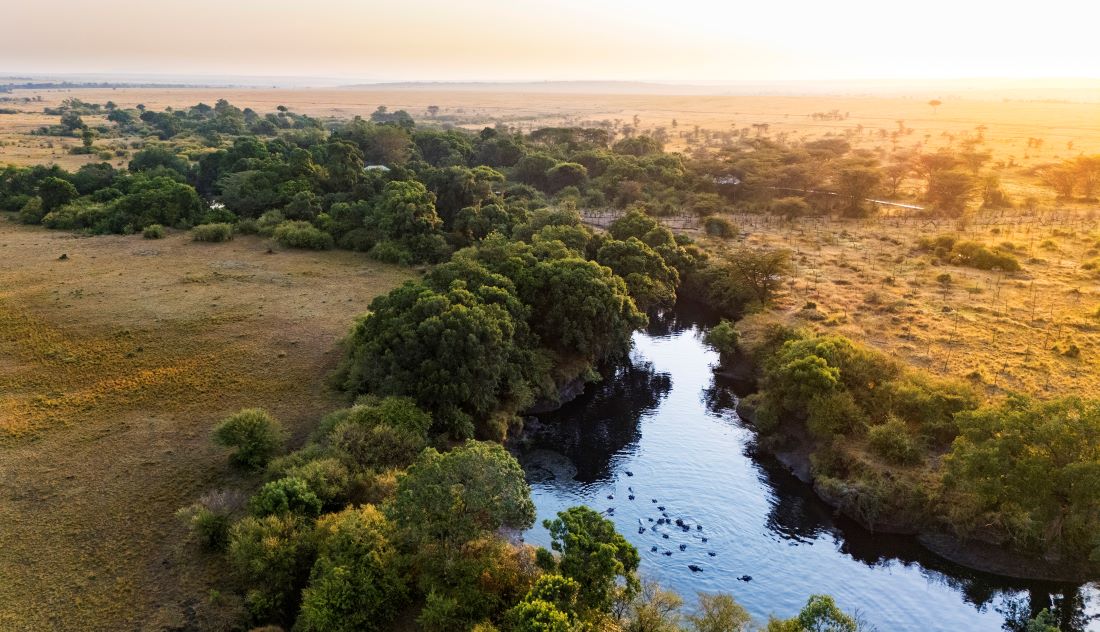 This holds true today, with the Foundation running education projects across Zimbabwe, Botswana and Kenya, with an emphasis on female empowerment. As an example, Beverly illustrates, “many [locals] have never had electricity. They’ve been permanently off the grid. We’re introducing solar power to them, but…as a micro business”. Dubbed Solar Mamas, the project trains females in the community so ” that they can run with it and install it in all the homes”.
This holds true today, with the Foundation running education projects across Zimbabwe, Botswana and Kenya, with an emphasis on female empowerment. As an example, Beverly illustrates, “many [locals] have never had electricity. They’ve been permanently off the grid. We’re introducing solar power to them, but…as a micro business”. Dubbed Solar Mamas, the project trains females in the community so ” that they can run with it and install it in all the homes”.
Other initiatives undertaken by the Foundation include Project Ranger, a conservation-first approach to guiding, and an accompanying Female Ranger Program; Conservation Roots, which allows guests to support conservation efforts restoring indigenous trees; and a programme training light aircraft pilots. Neatly illustrating of the scale of their impact, an impressive 95% of pilots around Great Plains camps in Botswana are locals. In fact, Dereck expands, “99.5% of our entire staff, which is nearly 1,000 people now, are local, and there’s been a massive increase in job opportunities and skills transfer for the communities”. It is, “of all things [what] we’re most proud of”.
As Beverly summarises, The Foundation means “positive change for the environment, for the wildlife, for the communities”. “[We] believe that the future of Africa is going to rely on these three pillars, which would be conservation, communities and some sort of income, commerce”, Dereck adds. “Without tourism, without conservation. Africa has no hope”.







